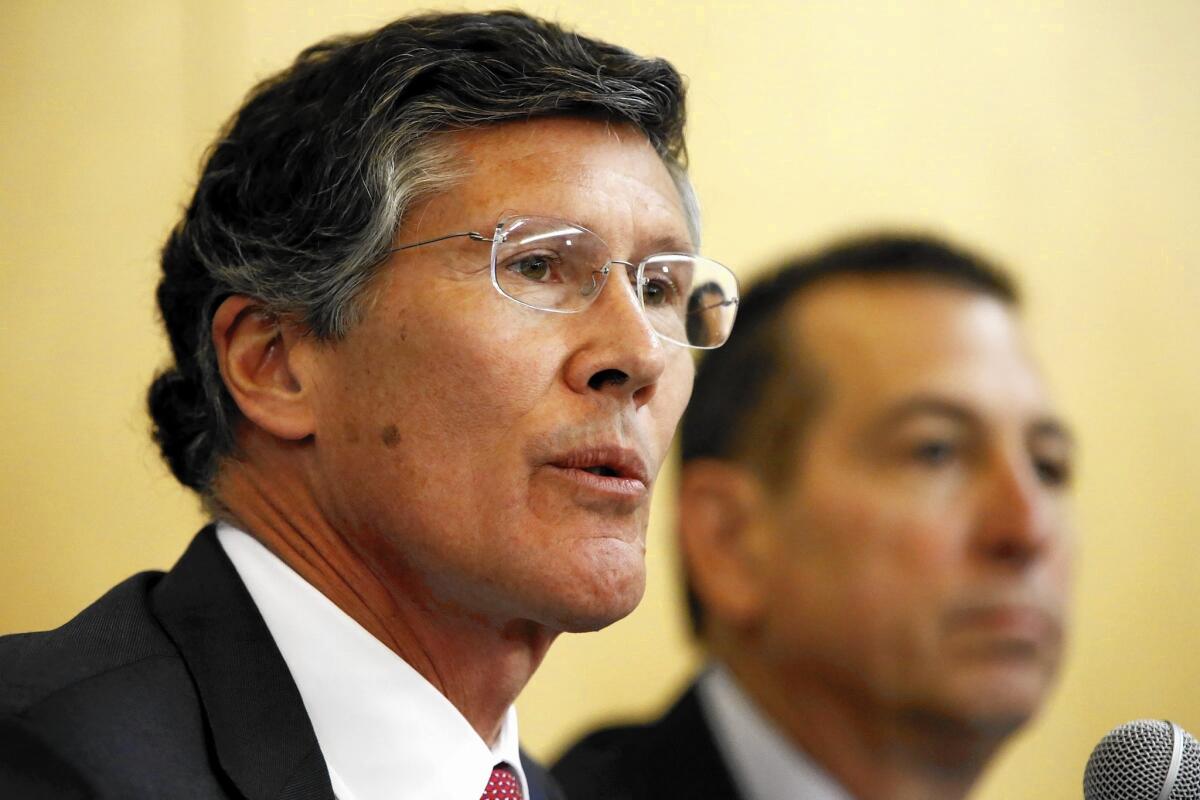CIT Group, OneWest Bank say merger would be good for poor neighborhoods

- Share via
The chief executives of New York commercial lender CIT Group and Pasadena’s OneWest Bank promised Thursday that the planned OneWest buyout would be good for poor neighborhoods, while critics said the $3.4-billion combination would create a “too big to fail” institution with inadequate commitment to local communities.
John Thain of CIT said the combined bank would provide “a significant increase” in lending, philanthropy and other support for lower-income and minority communities — aid required by a 1977 federal law, the Community Reinvestment Act, or CRA.
The intent, he said, is to earn an “outstanding” CRA rating instead of the “satisfactory” classification both banks received in their last reviews.
“We have set forth aggressive goals for community investment and development activities in Southern California,” Thain said, “including targeting $5 billion of community-related activities over the next four years.”
OneWest’s Joseph Otting said the deal would create a “hometown bank” big enough to compete with megabanks based elsewhere.
He said OneWest would ramp up small-business lending with CIT’s broader selection of loans, appoint minority representatives to an advisory board and provide funding so nonprofits and smaller banks can make microloans in poor areas.
The Federal Reserve and the Office of the Comptroller of the Currency, which regulates national banks, held the unusual hearing Thursday into public benefit and bank safety issues.
The regulators must approve CIT’s purchase of OneWest, a bank that a group of billionaire investors created from the remains of IndyMac Bank, a mortgage lender whose 2008 failure cost the federal deposit insurance fund a record $13.1 billion.
Such hearings, common during a 1990s bank consolidation wave, are rare these days; the last one in Southern California focused on Bank of America Corp.’s 2008 purchase of subprime mortgage specialist Countrywide Financial Corp. in Calabasas, which was teetering on the verge of collapse.
Critics complained at the hearing that OneWest’s community lending commitment, as a percentage of the bank’s deposits, was a fraction of what other banks had pledged and was made only as a way to grease the skids for regulatory approval. They urged the regulators to withhold approval for the merger until promises of assistance were increased.
Paulina Gonzalez, executive director of the California Reinvestment Coalition in San Francisco, said the $5-billion pledge, which includes $3.8 billion in promised loans to low-income borrowers, didn’t satisfy CRA public-benefit requirements.
“I’m not sure it even meets the laugh test,” she said.
Roberto E. Barragán, chief executive of VEDC Inc. in Van Nuys, a small-business development nonprofit, said no one from OneWest had ever offered to help him until the bank agreed to sell itself to CIT.
“Where have you been before the merger was announced?” Barragán said.
The critics were countered by numerous representatives from minority, church and community groups, who said they had been promised substantial assistance and welcomed it.
“We feel very confident that they want to meet and exceed the expectations of the community,” said Gilbert R. Vasquez, chairman of the Los Angeles Latino Chamber of Commerce.
Filipina immigrant Faith Bautista, chief executive of the National Asian American Coalition, praised OneWest’s willingness to modify mortgages for troubled borrowers and testified emotionally about Otting’s repeated personal visits to meet with minority leaders.
“I’m shaking right now because it’s not worth the time for us to be here fighting and arguing,” Bautista told a panel of 10 regulators, who sat taking notes in a conference room at the downtown L.A. branch of the Federal Reserve Bank of San Francisco.
She said OneWest had promised to make a low-interest line of credit available to her group, enabling it to make business loans of up to $12,000 in the Filipino American community.
Mark Whitlock, an Irvine minister representing a group of African Methodist Episcopal churches, said he also was gratified by OneWest’s pledges that it would make more small-business loans and increase the ethnic diversity of its workforce and board.
“This partnership will give birth to a new opportunity,” he said.
The merger would create a financial institution with more than $50 billion in assets, the threshold for a bank requiring stringent supervision because its collapse might jeopardize the financial system. It would be the first of these so-called strategically important financial institutions to be created since the financial crisis.
Like OneWest, CIT has experienced controversy, having avoided repaying a $2.3-billion taxpayer bailout during the financial crisis by filing for bankruptcy.
Supporters and opponents of the merger agreed on one thing: OneWest CEO Otting has made extraordinary efforts to reach out to minority groups, including long sessions spent in depressed sections of Los Angeles and Orange counties.
“What stands out is there’s a CEO who came our way — and not many have,” said Lee de León, pastor of Templo Calvario in Santa Ana, where three-quarters of the residents are Latinos.
Merger opponent Orson Aguilar, executive director of the Greenlining Institute in Berkeley, said a consensus had emerged: “Joseph Otting is a great guy.”
He urged Otting to name Bautista or Whitlock to the bank’s board of directors.
Twitter: @ScottReckard
More to Read
Inside the business of entertainment
The Wide Shot brings you news, analysis and insights on everything from streaming wars to production — and what it all means for the future.
You may occasionally receive promotional content from the Los Angeles Times.











